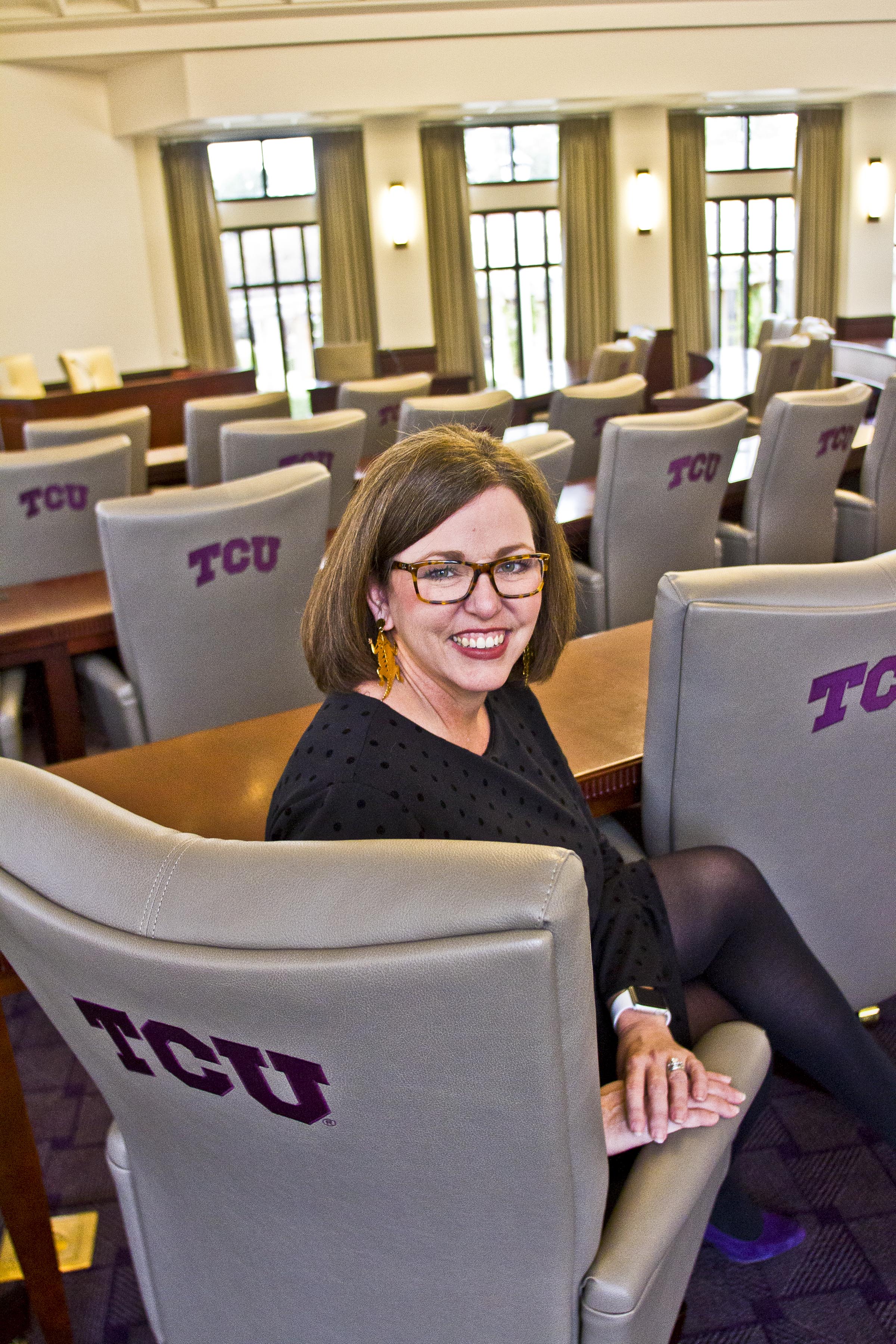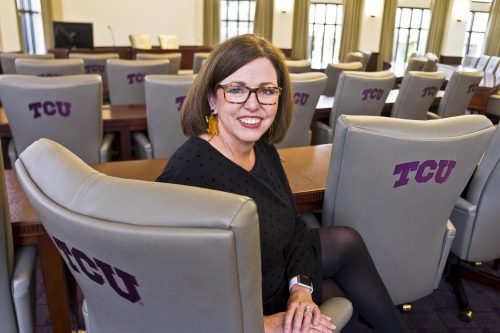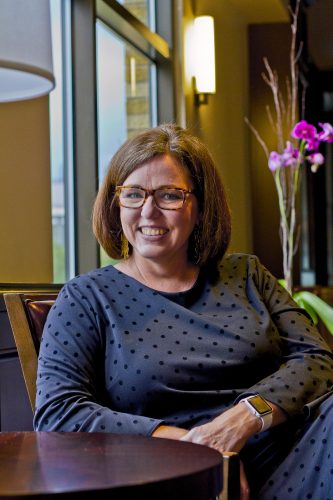New Associate Vice Chancellor for Alumni Relations Talks About TCU’s Growth
Amanda Stallings ’97 (MLA ’01) discusses the Dee J. Kelly Alumni & Visitors Center renovation and meeting people where they are.

Photo by Mark Graham
New Associate Vice Chancellor for Alumni Relations Talks About TCU’s Growth
Amanda Stallings ’97 (MLA ’01) discusses the Dee J. Kelly Alumni & Visitors Center renovation and meeting people where they are.
Why was the Dee J. Kelly Alumni & Visitors Center renovated?
I think it was a combination of a lot of things. Our living alumni population is growing. We are graduating more individuals than ever before. Everything we’ve done on campus is a culmination of that. The need to expand chapter cities and clubs and to provide programming for our alumni is growing, which just puts the demand on the alumni center to then grow its staff to accommodate the growing needs of our alumni. Our team members are sharp. They are strong. They are dedicated. They are innovative, and with that comes growth.

Amanda Stallings, associate vice chancellor for alumni relations, checks out the Justin Boardroom of the newly renovated and expanded Dee J. Kelly Alumni & Visitors Center. Photo by Mark Graham
What is the specific value of having a growing alumni relations program at a university like TCU that is establishing itself as a national university?
The stronger TCU gets academically and through athletic programs, the more valuable your diploma becomes. So if you graduated five years ago, a year ago or 20 or 30 years ago, the value of your diploma increases every year with the success of TCU. As the value of your diploma grows, the expectation of the services that we offer to our alumni grows as well. When we can offer programming to incoming students or to parents of active students or to alumni to inspire others in their community to look at TCU, then we’re continuing to increase the value of that diploma.
“Our team members are sharp. They are strong. They are dedicated. They are innovative, and with that comes growth.”
Amanda Stallings
How does being the new head of alumni relations, specifically at a university growing at a rate like TCU is, affect the way you conduct business?
I think it’s always looking at how to stay ahead of the curve. And how to continue to be innovative, how to do things that continue to attract alumni to stay engaged. Because if alumni are engaged and they are excited about TCU and they’re excited about programming, they’re also excited to give. That connection of us being able to provide that opportunity to keep them engaged and to inspire them to want to give back to the university that is allowing them to do the things that they’re doing in their lives today — I take that on as a huge responsibility, not only for me but for the entire team, to be able to deliver those types of opportunities.
How do you stay engaged with alumni who are living across the country or even across the world?
For those who are staying within the confines of the U.S., we’re really working hard to connect them with the chapter cities or clubs in their areas. We work hard to do that. In terms of international alumni, that’s something new that we’re really focusing on in the coming years — to really find pockets where we can connect those alumni and give them a way to feel that TCU connection. I think Horned Frogs Connect [the alumni online network] will help because they will be able to locate people easier in their region of the world.
What did you have in mind when you graduated from TCU?
When I left TCU, I definitely wanted to pursue a career in criminal justice. My first job was working in a juvenile detention facility in Fort Worth. And then from there, I moved to adult probation.

Amanda Stallings, a two-time TCU graduate, says the alumni population is growing and the renovated Dee J. Kelly Alumni & Visitors Center is ready to meet their needs. Photo by Mark Graham
What did you see as the value in getting a master’s degree in the liberal arts?
For me, anything in liberal arts allows you to be a universal student and a learner in anything. And because my career has been, really, in social services, it allows me to have an understanding of the world different from how I grew up. Being raised in a middle-class, two-parent home is not a typical environment for a lot of families. And the liberal arts degree really opens your mind and heart to how other people live in the world and how they communicate. Having that understanding of people, I think, has been a true key factor for me in my careers, whether it be in social service or in the hospital industry or even back now at TCU. Understanding how people work and where they come from really helps you understand how to work with them professionally.
“To be back on campus and to see what our professors are doing and to see what the students are doing on their own and listening — to me that’s what it’s all about.”
Amanda Stallings
How do you think your experience working in the criminal justice system and also with nonprofits will help you in your new position at TCU?
As you can imagine, our student population doesn’t all look alike. They don’t come from the same background; they don’t have the same experiences. … To come to a place which is becoming a melting pot for all different types of backgrounds and experiences, to have somewhat of an understanding of where they’re coming from and the type of experiences they are hoping to gain while they’re here and the ability to expose themselves to others who live differently than they do will be a constant help throughout their professional careers.
No matter what degree you get, whether you go into business or finance, public health, community service or social activism, you have to be able to understand and work with people. Because everyone doesn’t walk the same, doesn’t talk the same, they don’t act the same, so to be able to know how to work with all different types of people and to be able to find a common ground to solve problems is crucial. And for me, to be back on campus and to see what our professors are doing and to see what the students are doing on their own and listening — to me that’s what it’s all about.
— As told to Zach Martino
Edited for clarity and length.

Your comments are welcome
1 Comment
Amanda—
So proud of you for your Graduway Impact Award!
Miss you!!
Melinda Costin
Related reading:
Alumni, Campus News: Alma Matters, Features
Dee J. Kelly Alumni & Visitors Center Is Ready
The center is now two times bigger and better.
Alumni, Letters
Chancellor Celebrates Renovated Dee J. Kelly Alumni & Visitors Center
The reimagined facility connects our past, our future and one another.
Alumni
The Kelly Center is Expanding
Home to a thousand gatherings last year alone, TCU’s alumni center must grow to meet an escalating demand for space.